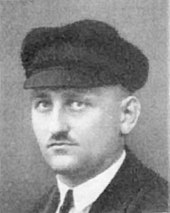Kurt Pohle
Kurt Pohle (born May 2, 1899 in Forst (Lausitz) , † November 3, 1961 in Neumünster ) was a German SPD politician .
Life and work
Pohle, who was Protestant , worked as a textile worker after elementary school. He took part as a soldier in the First World War, in which he was seriously wounded. After the war he worked as an editor for various social democratic newspapers until the ban in 1933. In 1933 he was arrested and sent to a concentration camp for a while . From 1939 to 1945 he took part in World War II and was taken prisoner by the United States. After his release, he settled in Eckernförde and played a key role in the reconstruction of Eckernförde and the state SPD.
Pohle was president of the board of directors of the north German group of " Lignikultur " as well as vice-president of the German Poplar Association. He was also the chairman of the "Schleswig-Holstein Aid for War Victims" and the advisory board of the German Disabled Sports Association.
Political party
Pohle belonged to the SPD from an early age. After the Second World War he was elected to his party's executive committee. He was also the state chairman of the SPD-affiliated workers' welfare in Schleswig-Holstein .
MP
From 1924 to 1929 Pohle belonged to the city council of Sommerfeld , then to 1933 to the city council of Striegau . From 1930 to 1933 he was a member of the Reichstag for the constituency of Breslau and briefly (1932) also a member of the Prussian state parliament .
After the Second World War, Pohle became a member of the state parliament in Schleswig-Holstein in 1946, he represented the constituency of Rendsburg- Ost in parliament . From April 11 to November 11, 1946 he was chairman of the Committee for People's Welfare. After his election to the German Bundestag in 1950, his membership in the state parliament ended.
From his first election in 1949 until his death in 1961 , Pohle was a member of the German Bundestag as a member of the SPD state list of Schleswig-Holstein; as a direct candidate for the former constituency of Schleswig - Eckernförde, he was subject to rival candidates during this time. From 1949 to 1953 he was deputy chairman of the Bundestag committee for questions of the health system and from October 1, 1952 to June 26, 1953 of the " Committee of Inquiry into the Inadequate Recruitment of Severely Disabled Persons in the Federal Authorities". He also served from April 16, 1951 to 1953 and from 1957 to 1961 as chairman and from 1953 to 1957 as deputy chairman of the Bundestag Committee on War Victims, Prisoners of War and Returners, whose name varied slightly in the individual election periods.
Although Kurt Pohle never belonged to the Presidium of the Bundestag, he was briefly entrusted with chairing the session by Bundestag President Eugen Gerstenmaier on April 18, 1958, as all of the Bundestag Vice - Presidents and Senior President Marie-Elisabeth Lüders were absent.
Public offices
Pohle was under Theodor Steltzer from June 12 to November 22, 1946 Minister of Public Welfare and then until April 29, 1947 Minister of Health in Schleswig-Holstein. From February 28, 1949 to May 31, 1950 he was Parliamentary Representative of the State Minister for Labor, Economics and Transport.
Honors
The Kurt-Pohle-Weg in Husum and the Kurt-Pohle-Straße in Eckernförde are named after Kurt Pohle . There is a Kurt Pohle memorial stone in Wahlstedt .
literature
- Martin Schumacher (Hrsg.): MdR The Reichstag members of the Weimar Republic in the time of National Socialism. Political persecution, emigration and expatriation, 1933–1945. A biographical documentation . 3rd, considerably expanded and revised edition. Droste, Düsseldorf 1994, ISBN 3-7700-5183-1 .
Web links
- Literature by and about Kurt Pohle in the catalog of the German National Library
- Kurt Pohle in the database of members of the Reichstag
- Kurt Pohle in the state parliament information system Schleswig-Holstein
Individual evidence
- ↑ The senior president: A constitutional regulation and its alternatives . Springer-Verlag, 2011, ISBN 978-3-531-94362-6 , pp. 214 ( books.google.de [accessed on October 17, 2015] see footnote).
| personal data | |
|---|---|
| SURNAME | Pohle, Kurt |
| BRIEF DESCRIPTION | German politician (SPD), MdR, MdL, MdB |
| DATE OF BIRTH | May 2, 1899 |
| PLACE OF BIRTH | Forst (Lausitz) |
| DATE OF DEATH | 3rd November 1961 |
| Place of death | Neumunster |

